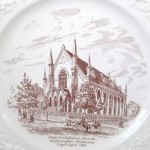Sermon by Randall T. Clayton, Brown Memorial Woodbrook Presby. Church, Baltimore, MD. December 11, 2016. Text: Isaiah 61:1-11
I was once the pastor of an inner city church which had burned to the ground about 10 years before I arrived. Pretty much nothing was left when the flames were finally doused—there was a partial wall left standing on one side of the complex, a single small stained glass window that was still in one piece, and oddly, virtually all of the choir music. Apparently it had been packed into the music room cubbies so tightly that no air got to it. But everything else was in ruins.
before I arrived. Pretty much nothing was left when the flames were finally doused—there was a partial wall left standing on one side of the complex, a single small stained glass window that was still in one piece, and oddly, virtually all of the choir music. Apparently it had been packed into the music room cubbies so tightly that no air got to it. But everything else was in ruins.
Even though it had been about a decade since the tragic fire had swallowed the building in just a few hours, the memories of the devastation were still fresh on people’s minds during the time I served that congregation. Ultimately it had taken the church three years to rebuild because their insurance nowhere near covered the cost to construct a new church building, and also because they had to fight the city historic commission. The commission was not particularly willing to sign off on a construction permits unless the church was willing to rebuild the new structure exactly like the old one. And the church wasn’t willing to do that. The old structure, built in the 1860s, included a sanctuary that would seat 1200 people, something that a congregation that then numbered about 150 didn’t need and couldn’t afford.
Listening to accounts from my members of how painful it had been to see flames light up the night sky, and to watch the timbers and windows crash to the ground as flames ate up the old wood, I also realized that embedded in these stories was joy. Joy. Yes, joy. During that time in which there building lay in ruins, the church had very significant growth in their membership –the greatest growth, in fact, in decades. New people had been attracted and had become congregational leaders during that difficult time. It was during that period that the church carefully looked at their ministry to discern what God was calling them to become and what their path forward would be in light of the ruins that lay just a few blocks from where they were then gathering on Sunday mornings. The vision they discerned created excitement and ignited passions that carried this group of faithful Christians for a number of years thereafter. And when they talked about the care and concern expressed for them during that time their building lay in ruins by neighboring congregations, and from people they had never met from throughout the country who saw news reports of the fire, and from their Presbytery, it was clear that these expressions of support were seen as signs of God’s presence even among the ruins.
While the new building constructed from the ruins won architectural awards, and while it was sized perfectly for that church, and while it opened renewed opportunities for serving the community, none the less, even years afterward, people still missed the stained glass windows, the high vaulted wooden ceiling of the old sanctuary, and the huge pipe organ too, all of which had been reduced to rubble one night. And yet, there was joy too…Joy that the gentleman who was homeless that the church allowed to sleep in a basement apartment on cold nights had not been hurt in the fire; joy that the congregation had grown in numbers and in commitment through the experience; joy that the fire had destroyed only their building; and joy that they found some new opportunities for mission and ministry even among the ruins. As sad and as tragic as the fire had been, they managed to find joy even among the ruins. And they aren’t the only people who have found joy among the ruins of life.
The community to which Isaiah was speaking in the 61st chapter of the book bearing his name had returned home after 60 years of exile in Babylon. While their homecoming was surely and answer to their fervent prayers, what they found was not what they were longing for. Their beloved temple was in ruins. Villages and homes had been destroyed. It was a bleak time in the nation—there was bitter enmity between rival groups, civil and religious leaders looked only after personal gain and the court system was riddled with corruption. Low community morale coupled with a vindictive spirit was the order of the day. As one scholar wrote, “Whatever joy there may have been in the anticipation and actual activity of returning to the homeland probably disappeared within several years. In place of joy came endless days of frustration and even despair born of summer heat, drought, crop failures, plagues, difficult work, and poverty.” [Author and location of quote unknown to this writer] It was to these people who were living in the mist of physical ruins and emotional ruins that we find the words we read a few minutes ago.
Although you may not have realized it as I read the passage a little while ago, there are actually three distinct speakers and sections in it. The first is Isaiah, who proclaimed that God’s spirit had anointed him to bring good news, to bind the broken hearted, to proclaim liberty, to proclaim the year of the Lord—that time when slaves would be freed, debts marked forgiven, and the world would be marked by equality and justice for all. It was his task, he said, to give the people the garland of joy not the smudge of ashes, to help the people stand strong and tall as a planting displaying God’s glory. And he proclaimed that yes, one day the ancient ruins would be rebuilt and the cities repaired. Maybe it didn’t seem like it, or feel like it, but his message was essentially, God is there with you, even in the ruins. Even though you can’t see it or feel it now, the ruins all around you will one day rise again.
In the next few verses of the passage it is God who is speaking….”I the Lord love justice,” God said. “I hate robbery and wrongdoing.” And, I the Lord, make an everlasting covenant with my people. I am your God. You are my people even among the ruins.
And then, having heard Isaiah proclaim what God’s spirit had anointed him to do, and having heard God reaffirm God’s commitment to God’s people, in the next section it is the people who are responding. And so, although the last few verses in this passage appear to be the words of one speaker, I think it is appropriate to read those verses substituting “we” for “I”.
We will greatly rejoice in the Lord. God has clothed us with garments of salvation. God has covered us with the robe of righteousness. For as the earth brings forth its shoots, and as a garden causes what is sown in it to spring up so the Lord God will cause righteousness and praise to spring up before all the nations.
“Joy to the world,” they could sing, as they remembered God’s love, commitment and promises. Joy to the world, even among the ruins.
Thankfully, our church is not in ruins, but all is not right with the world. Many among us feel unsettled about what tomorrow will bring, and disappointed and fearful of the forces of hate that seem to have been unleashed in recent months in our nation and others know what it means to be scapegoated or victimized or stigmatized. In this post truth world, facts seem no longer to be facts and fake news causes people to take guns to a pizza parlors. And goodness knows, cancer still kills, fires still burn, and special people still die. It’s all enough I think to make us wonder, in times like these can there really be joy?
Julie Andrews once sang about her favorite things and told us that when the dog bites, or the bee stings she remembers her favorite things and then she didn’t feel so bad. [“My Favorite Things”, from Rogers and Hammerstein musical, The Sound of Music]
While perhaps remembering our favorite things can sometimes take some of the sting off of a bad day, or bring a measure of comfort in moments of struggle and trial, I’m not sure that just remembering our favorite things necessarily leads to an abiding sense joy when we find ourselves living among the ruins of our hopes or the ruins of our security or among the ruins of our dreams. But I do think that we might recover a sense of joy even among the ruins by remembering God’s commitment to creation, a commitment and a promise made crystal clear in the birth of Jesus Christ, Son of God, Word made flesh.
And perhaps there is joy to be found in holding tightly to God’s vision for creation as a place where all know peace, all know hope, all have enough, a world that Isaiah compared to a lush, and vibrant garden. Despite what we see and experience in our world that seems to testify to the opposite, the promises of God are Gospel truth. God will not let us go. Evil will not win. God has not abandoned us even when we find ourselves living in the ruins.
 Nenri Nouwen once said, “Joy does not simply happen to us. We have to choose joy and keep choosing it every day.” Perhaps we choose joy in consciously calling to mind what God has done in Jesus Christ, by remembering a holy birth, a faithful life, a cross and an empty tomb as well. Perhaps we choose joy in remembering God’s liberating love in Jesus Christ and by training our sights on God’s vision for creation, and letting that vision fuel us to do our part to free the oppressed, to comfort the mourning, to bind up the broken hearted, to offer a garland instead of ashes and the oil of gladness in the hurting world around us.
Nenri Nouwen once said, “Joy does not simply happen to us. We have to choose joy and keep choosing it every day.” Perhaps we choose joy in consciously calling to mind what God has done in Jesus Christ, by remembering a holy birth, a faithful life, a cross and an empty tomb as well. Perhaps we choose joy in remembering God’s liberating love in Jesus Christ and by training our sights on God’s vision for creation, and letting that vision fuel us to do our part to free the oppressed, to comfort the mourning, to bind up the broken hearted, to offer a garland instead of ashes and the oil of gladness in the hurting world around us.
Because of God’s commitment to us, God’s love for us, and God’s presence among us, it is possible to sing “Joy to the World,” even among the ruins, even this year, even today.
